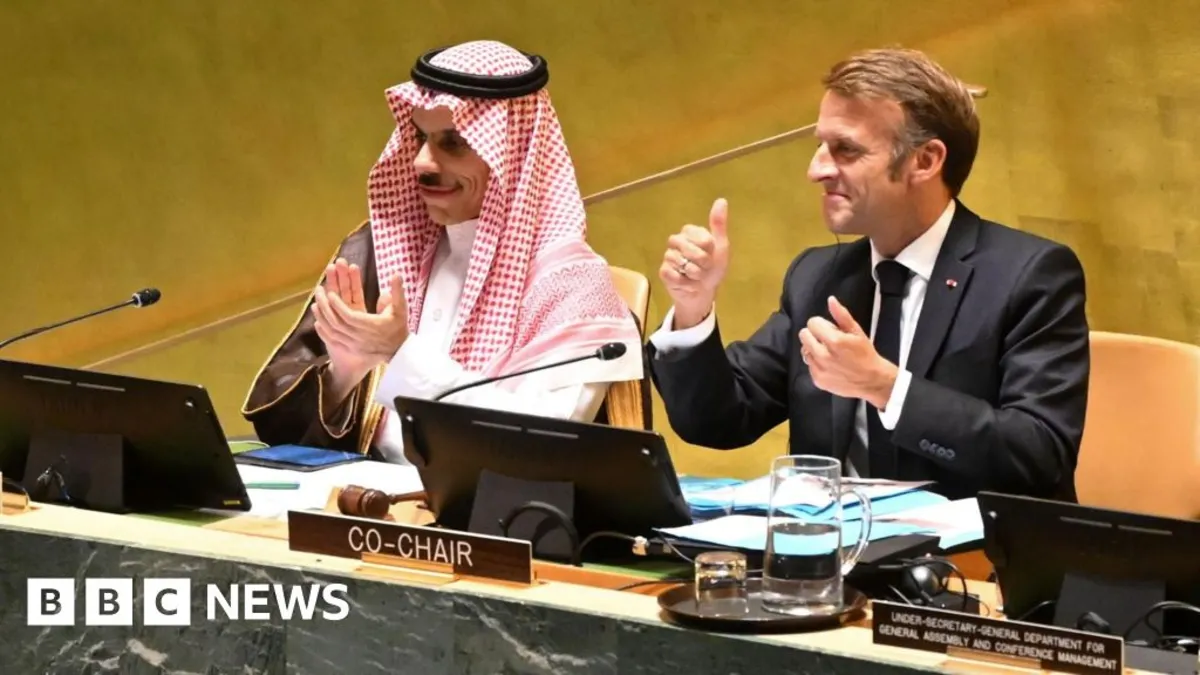
The recent recognition of a state of Palestine by Britain and France at the United Nations marks a historic turning point in the enduring Israeli-Palestinian conflict. This unprecedented diplomatic move reflects a growing consensus among major European powers that the situation has escalated to a point where intervention is necessary. As the humanitarian crisis in Gaza worsens, French President Emmanuel Macron has emphasized that right must prevail over might, asserting the need for a balanced approach to the ongoing conflict.
This decision, coordinated with the United Kingdom and backed by Saudi Arabia, aims to sustain the viability of the long-standing two-state solution. European leaders believe this framework is essential for achieving a fair and equitable future for both Israelis and Palestinians. Conversely, UN Secretary General António Guterres warned that failing to support a two-state solution risks leading to a one-state scenario characterized by Israeli dominance and Palestinian subjugation, which he condemned as unjustifiable collective punishment and ethnic cleansing.
The Israeli government has reacted with outrage, perceiving the UN conference and the recognition of a Palestinian state by various countries—including the UK, France, Canada, and Australia—as a concession to Hamas following its attacks on Israel and the hostage crisis that began on October 7, 2023. Some Israeli ministers have suggested that the appropriate response to this recognition would be the annexation of portions of the occupied West Bank, effectively eliminating any possibility for a viable Palestinian state.
Prime Minister Benjamin Netanyahu's coalition, which includes far-right elements advocating for the expulsion of Palestinians and the expansion of Jewish settlements, is intent on dismantling the two-state solution framework. Meanwhile, the Trump administration continues to support Israel vigorously, disavowing the European approach and imposing restrictions on Palestinian Authority (PA) President Mahmoud Abbas, who was barred from attending the UN conference and spoke via video link instead.
This conference and the US administration's response mark one of the most significant rifts between Washington and its European allies regarding strategies to address the Middle East conflict. European leaders assert that they have no choice but to act in light of the deteriorating situation—Israel has deployed a third army division into Gaza City, leading to daily casualties among Palestinians, while Hamas continues to hold nearly 50 hostages. The West Bank remains under siege from expanding Israeli settlements and escalating settler violence.
President Macron's diplomatic strategy aims not only to bring an immediate resolution to the war in Gaza but also to pave the way for a sustainable two-state solution. European leaders contend that Israel's current strategy has failed, resulting in increased civilian suffering and jeopardizing the lives of hostages. Notably, the conference was also supported by Saudi Arabia and the Arab League, signaling a collaborative effort to influence Hamas to disarm and transfer power to the PA, thus eliminating Hamas' leadership role in Palestinian affairs.
Macron believes that this diplomatic initiative could create incentives for Israel while potentially opening avenues for the normalization of relations between Israel and Saudi Arabia—a long-desired objective for both Netanyahu and Trump. However, the decision to recognize a Palestinian state against the backdrop of US opposition represents a high-stakes diplomatic gamble.
As Macron addressed the United Nations, he appeared determined to assume a global leadership role aimed at resolving the dire situation in Gaza and forging a shared future for Israelis and Palestinians. However, the absence of US leadership diminishes the potential for the kind of meaningful pressure that only Washington can exert on all parties involved. The Trump administration's rejection of the European approach further complicates the situation, as the former president is scheduled to address the UN and meet with Arab leaders, emphasizing the disjointed nature of international efforts.
The ongoing dysfunction among key players and Qatar's reluctance to re-engage as a mediator post-Israel's attack on Hamas leaders further illustrates the complexities of achieving peace in the region. As the situation unfolds, the world watches with bated breath to see whether these diplomatic efforts can lead to a sustainable resolution to the Israeli-Palestinian conflict.